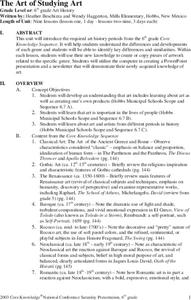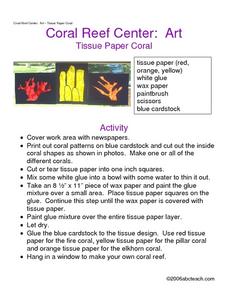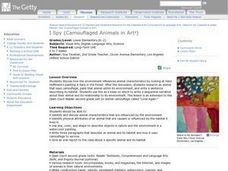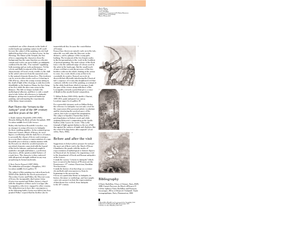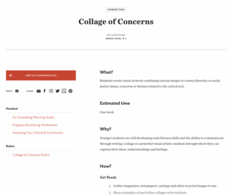Curated OER
Imagining China Through Words
Learners create a drawing from a written description and examine and discuss how European artists from the past created images of China that combined imagination with written descriptions and limited visual imagery.
Curated OER
Introducing Visual Literacy
Students view examples of images and discuss why a director or writer chose these images. Using different forms of media, they develop their own standards by which to judge television or films. They discover the use of visual literacy...
Curated OER
Poetry and Visualization
Learners use visualization techniques when reading poetry. In this visualization and poetry lesson, students work in groups to present a tableau that depicts a word from the poem as classmates guess the word. Learners then...
Curated OER
Racism, Gender, Ethnicity, and Aesthetics in the Art of Graffiti
Students describe how graffiti is a part of everyday culture. They develop basic vocabulary terms for thinking and writing about graffiti and make and justify judgments about aesthetics qualities in graffiti art. They compare and...
Curated OER
Picture This: Visualization
Sixth graders practice visualizing and understanding that visualization is an important comprehension strategy. They share their visualization of the story through original artwork and determine that ideas, and cultural settings can...
Curated OER
Emotion in Art & Poetry
Fourth graders are introduced to famous works of art and begin to discuss the artist's work. Use art to explain and reflect their own emotions. The write about feelings in a work of art and make connections between art and other...
Curated OER
Numbers in Art
Students choose a number from one to twelve and tell a number story about it. They listen to the teacher read "Numbers in Art" by Lucy Micklethwait. Students choose three numbers from one to twelve and view works of art while looking for...
Curated OER
Money and Business (Art)
Third graders investigate world currency by creating their own coin art. In this government lesson, 3rd graders examine the characteristics of different coins and create their own design for a new one. Students discuss and...
Curated OER
The Art of Studying Art
Students explain the value of different genres of art. In this art lesson, students describe the differences in various genres of art and make comparisons between them. Students choose an art genre and create an original work of art...
Curated OER
Visual Impairment Based on a Children's Book
Students explore practical information about visual impairment. They explore about the uses of seeing eye cane. Students explore the postive aspects about how people fucntion in spite of handicaps. They explore about helping others.
Curated OER
Protesting through Art
Students experience critiquing, analyzing, and comparing different works of art from different eras. They discuss how these works can or can't be considered a form of protest and assess how to evaluate their own judgments and values on...
Curated OER
Exploring War Themes in Art and Poetry
What is war? Students discuss the ethical dilemma of war by viewing Picasso's painting entitled "Guernica" and write down everything they see in the painting. Then they choose one emotion that best summarizes their emotional response to...
Curated OER
Coral Reef : Art Tissue Paper Coral
In this coral reef art worksheet, students follow directions to complete a piece of art. Students use cardstock, tissue paper, and wax paper to make a beautiful picture.
Curated OER
I Spy (Camouflaged Animals in Art!)
Make connections about animal characteristics and the animal's environment. In this animal characteristics lesson plan, learners use a piece of art as a springboard for a discussion about animals and camouflage. Students choose an animal...
Curated OER
What do two-dimensional tessellations look like? Where in art can they be found?
Students explore the world of art and culture, including the works of M.C. Escher. They identify and create original tessellations. Students use a wealth of interactive multimedia applications. They explore the artistic representations...
Curated OER
Portraits in the Birmingham Museum and Art Gallery
In this art gallery set of worksheets, students examine a set of portraits that are located in the Birmingham Museum and Art Gallery. They answer a set of questions about each piece of art which is pictured on the worksheets.
Curated OER
Faces of the community (the): Art from the Heart
Students understand the selflessness of the artists Gauguin and Van Gogh. In this art lesson plan, students produce art work that reflects the diversity in the their school community. Students share their artwork to explain how they show...
Curated OER
Drama: Three Words
Seventh graders practice dramatic acting skills, using three words - why, oh, and sorry in different contexts. Working in groups of two or three, they create scenes in which the three words are the only ones spoken and are used to convey...
Curated OER
Microsoft Word Lesson 2
Fourth graders investigate some of the basic functions of using Microsoft Word. The teacher uses a LCD projector to give instruction and guide the lesson plan. They practice finding the menu screens to perform basic editing and command...
Curated OER
Tap Dancing Word Search
In this Tap Dancing Word Search worksheet, students find 14 words related to tap dancing. An example of the words include lessons, piano, and tuxedo.
Curated OER
References to Antiquity in Visual Arts (1848 - 1914)
Examine the Latin and Greek language and civilization during the 19th century by exploring the mediums available then. Learners examine scenes related to Greek and Roman literature and compare and contrast them.
Teaching Tolerance
Collage of Concerns
A picture can speak louder than words. An interesting lesson introduces the themes of social justice and diversity to young learners by having them create artwork. Scholars create collages from a variety of sources to showcase what...
University of Minnesota
Beautiful Brain: Step Inside the Brain
Before digital microscopes, scientists hired artists to draw the things visible in the microscope. Through training in neuroscience and art, Cajal revolutionized the way we view the beautiful brain. The third lesson in a series of four...
North Birmingham Academy
Color Theory
What better way to learn about colors than by coloring? Starting with the primary colors, young artists follow written prompts to shade in various rectangles and a color wheel to show complementary colors, tints and shades, and more.










